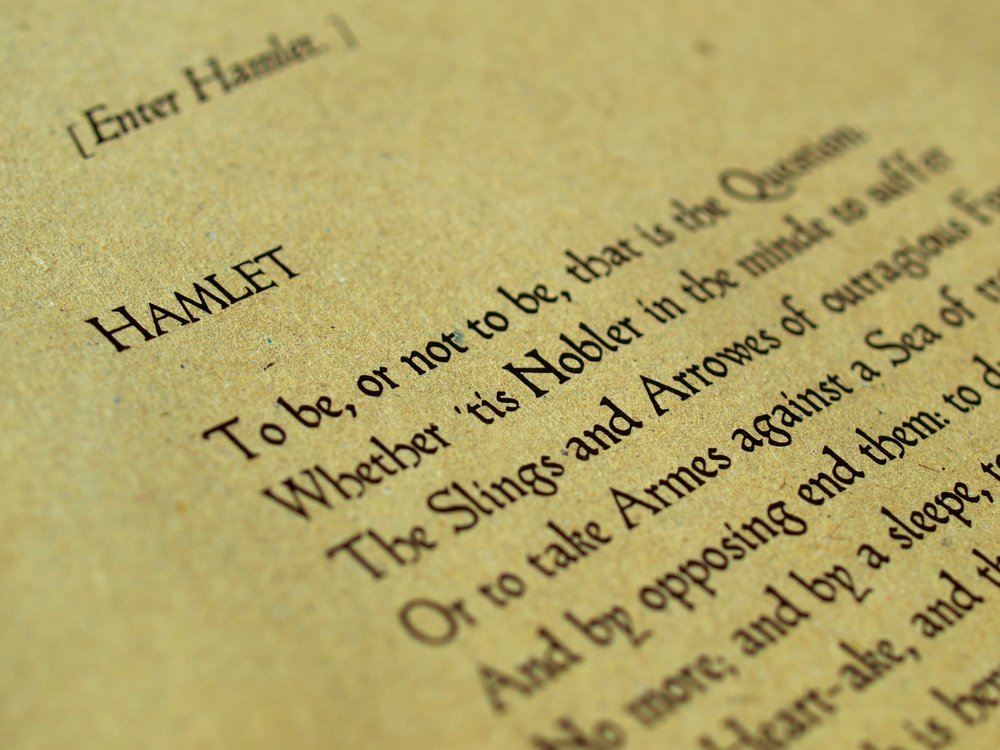

If Shakespearean English is the benchmark, then not many of us know English. Even simple interactions sound odd and wordy. Take the opening of Hamlet:
BERNARDO: Who’s there?
FRANCISCO: Nay, answer me: stand, and unfold yourself.
BERNARDO: Long live the king!
FRANCISCO: Bernardo?
BERNANDO: He.
FRANCISCO: You come most carefully upon your hour.
BERNANDO: ‘Tis now struck twelve; get thee to bed, Francisco.
FRANCISCO: For this relief much thanks: ’tis bitter cold, And I am sick at heart.
You can kind of understand what is being said, but some sentences seem too flowery like “unfold yourself”, too wordy like “you come most carefully upon your hour” or jumbled up like “for this relief much thanks”. Remember it’s only downhill from there in terms of understanding Hamlet!
But that’s historic “olde” English you may argue. So let’s look at some contemporary versions of English starting with cockney rhyming slang, which originated in the East End of London. Can you understand the following sentence?
“It nearly knocked me off me plates – the septic was wearing a syrup! I couldn’t believe me mincers, so I ran up the apples, got straight on the dog to me trouble and we had a Turkish.”
It’s hard to understand, but the words true meaning is what they rhyme with. Here’s a dictionary to help translate:
plates-of-meat = feet
septic tank = yank
syrup of figs = wig
mince pies = eyes
apples and pears = stairs
dog and bone = phone
trouble and strife = wife
Turkish bath = laugh
So it would translate to:
“It nearly knocked me off me feet – the yank was wearing a wig I couldn’t believe me eyes, so I ran up the stairs , got straight on the phone to me wife and we had a laugh ”
You can find more rhyming slang terms here.
Other variations of English can be found in the countries once ruled by the British. Take Singapore, there “street” English or Singlish has developed over the years. It mixes Chinese, Malay and Indian influences with “standard” English. If you ever go to street markets you’ll hear this distinctive form of English. Some of the modifications include:
There are also new words like “wah lau” which is a sign of exclamation: “wah lau, i have so much work”. And of course, we can’t forget the addition of “lah” to the ends of sentences. It usually softens the sentence, so “drink lah” (“just drink“) or “okay lah” (okay, don’t worry about it).
Staying in Asia, Indian English or Hinglish is worth understanding. Some of the unique features include:
Like Singlish, Hinglish also has some random filler words. One is the sound/word “toh”. It would be used in a sentence like “he toh is very rude”. No-one quite knows what it means, but it pops up all the time in English conversations in India.
Of course, the biggest standard bearer of English are the Americans, who have developed their own version of English. Americanisms include the phrase “what’s up?” – which means “what is the update?” or “what is happening?”. There’s a whole bunch of American words that may not be understood by non-Americans:
ballpark – doesn’t mean stadium, but rather expectations. “I hit it out of the ball park” (I did much better than expected), “here’s a ballpark figure” (here’s my estimate of the figure)
flake – doesn’t mean “flakes” on a croissant, but rather someone who can’t be relied upon: “he’s such a flake”.
going postal – doesn’t mean you will be sending something by mail, but rather someone is about to get very very angry. Originates from overworked postal workers who went on shooting sprees in the 1980s.
Monday morning quarterback – doesn’t mean someone playing American football at 9am on Monday, but rather someone who criticises someone else after the event.
A subgenre of American English is American slang spawned by hip hop. New words include:
stunting or flexing – showing off (eg “you needa stop flexin’“)
mane – man (eg “gimme that drink, mane”)
trill – someone who is well respected. It combines “true” and “real” (eg “We all got families to feed. So all I can do is be trill”)
homie – very close friend. Derived from “homeboy” or someone from a similar background as you.
balling – to be rich. (eg “Dat mane is balling”)
Finally, the digital era has taken English literally into a new dimension. This has created “text messaging” English, which are often acronyms that shorten words. Well known ones are: 2nite (tonight), BTW (by the way), FWIW (for what it’s worth), IMHO (in my humble opinion), and OMG (Oh my God). But here are some less commonly known ones:
143 – I love you
7k – sick, really cool
BEG – big evil grin or a wannabe
CUA – clean up afterwards, see you around,
DBBSWF – dreamboat body, shipwreck face
ESH – experience, strength and hope
GAHOY – get a hold of yourself, or adolescent suffering from “teenage” issues (acne, breaking voice)
J5M – just five minutes
KYR – know your rank or role
ONNA – oh no, not again
PXT – please explain that, or picture message
SHID – slap head in disgust
TOBAL – there oughta be a law
u8 – you ate?
YTTM – you talk too much
So before you think you know English, think again, and learn some English. Even the BBC is recognising this with its own (Nigerian) pidgin english site!
Bilal
Spring sale - Prime Membership only £3 for 3 months! Get trade ideas and macro insights now
Your subscription has been successfully canceled.
Discount Applied - Your subscription has now updated with Coupon and from next payment Discount will be applied.